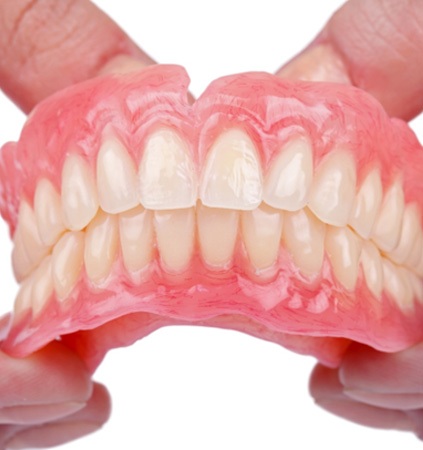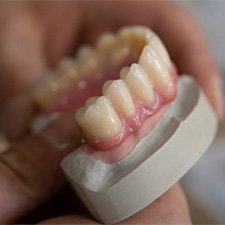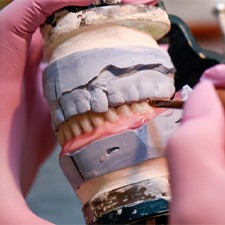Dentures Richmond
Tried-and-True
Tooth Loss Solutions
Going through your everyday life when you’re missing teeth can be difficult, to say the least. Not only can it hinder your confidence in your appearance, but eating and speaking become incredibly frustrating. One easy way to enjoy a full and complete smile again is by replacing your lost teeth with dentures in Richmond, VA. At Brown, Reynolds, Snow, LeNoir Dentistry, we can bring back any number of missing teeth with these tried-and-true tooth loss solutions. Call us today to find out how our high-quality dentures can help you smile again!
Why Choose Brown, Reynolds, Snow, LeNoir Dentistry for Dentures?
- State-of-the-Art Implant Dentures Offered In-House
- High-Quality, Lifelike Materials Used
- Award-Winning Dental Care & Service
Who’s a Good Candidate for Dentures?

Most patients, whether they’re missing just a few teeth or an entire arch, make good candidates for dentures. To make sure that this solution is right for you, your dentist in Richmond will conduct a thorough exam of your gums and remaining teeth during an initial consultation. If we find any untreated oral health issues, such as gum disease, we’ll have to address those before we can move forward with your tooth replacement process.
Effects of Missing Teeth

As you can imagine, tooth loss can have a significant impact on both oral health and overall well-being. The American College of Prosthodontists states that tooth decay, gum disease, and dental injuries are among the most common causes of missing teeth. Failing to replace the gaps in your smile can lead to a range of negative consequences.
For example, facial sagging can occur as the surrounding muscles lose support, resulting in a prematurely aged appearance. You may also have difficulty speaking or eating due to changes in bite alignment. Some patients may even experience lower self-esteem, as gaps in the smile can affect one's confidence and social interactions.
What Qualifies You for Dentures?

Dentures are an excellent solution for patients who have experienced significant tooth loss, suffer from tooth sensitivity, have extensive decay, and possess sufficient healthy gum tissue and jawbone. However, it’s crucial for those considering dentures to be committed to their dental health routine and willing to care for their dentures and smile.
The number of teeth you’re missing plays a key role in determining the best type of denture for you, whether it's full dentures, partial dentures, or implant dentures. It’s worth noting that dentures also tend to be a cost-effective tooth-replacement option, making them an ideal choice for patients on a budget.
Alternative Tooth-Replacement Options

Don’t qualify for dentures? That’s okay! You can replace your missing teeth with alternative tooth-replacement solutions like:
- Dental Bridges – These are ideal for patients missing one or several teeth in a row. For successful treatment, you must have nearby healthy teeth on either side of the gap to support the bridge.
- Dental Implants – Our team can insert titanium posts directly into your jawbone to support your new teeth. While this option offers unmatched stability, you must have a strong facial structure and sufficient bone density to be considered a viable candidate.
Types of Dentures

Dental technology has come a long way since the days of hearing your grandparents complain of ill-fitting or uncomfortable dentures. Today’s dentures are more lifelike than ever before. Based on your individual needs and preferences, our dentists can recommend one of the three types of dentures:
Partial Dentures
If you’re only missing a small number of teeth, a partial denture can seamlessly fill the empty spaces. Artificial teeth are attached to a gum-colored base that clasps behind your remaining teeth. Once the partial is in place, others shouldn’t be able to tell the difference between which teeth are real and which are the denture!
Full Dentures
We can recreate an entire arch of teeth with a full denture. Like partials, full dentures consist of a pink base and realistic replacement teeth. However, this prosthetic sits directly on the gums and remains in place with adhesive, natural suction, or some combination of the two.
Implant Dentures
Also known as hybrid dentures, implant dentures are secured onto a small number of dental implants that we surgically place throughout the jaw. Implant dentures not only last several times longer than traditional dentures, but they also prevent unwanted slipping.
How Dentures Are Made

Knowing how dentures are made allows you to have a deeper appreciation of these prosthetics. The time and attention that is required to make these customized teeth ensures that you receive a smile that looks natural, feels comfortable, and lasts a long time. As you await your new set of teeth, spend a few minutes learning more about what goes in to making these trusted and reliable prosthetics.
What Are Dentures Made Of?

Two pieces make up a denture – the base and the artificial teeth.
The base is formed using a variety of materials; however, acrylic is proven to be one of the more popular options among patients and dentists. Mimicking the natural color of gum tissue, they blend in with your existing smile so that they do not stand out or cause others to notice a difference.
The artificial teeth that are made are carefully placed onto the base using a skilled hand and artistic eye. Similar to the natural size, shape, and shade of any existing teeth, they blend in just like the base so that no one will be able to tell that you’re wearing dentures.
The Denture Creation Process

Creating dentures requires multiple steps, and you should not expect to see your new prosthetic overnight. It can take months before the final version is complete, but the results are worth the wait.
After capturing impressions and measurements of your jaw and mouth, our team will send them off to a local dental lab, where technicians will use the impressions to create a wax mold of your new denture. Building a base, an articulator is then used to place each artificial tooth. It is then sent to our dental office for the first fitting.
If pleased with the initial look, the dentures will be taken back to the lab, where they are boiled before having plaster incorporated into the mold. This helps to form the new shape of your dentures before any acrylic is injected. This ensures that the wax is replaced, and any plaster is removed before moving forward.
After placing the dentures in an ultrasonic bath, all plaster and excess acrylic come off so that the final set of dentures is returned to the dentist’s office for a final fitting.
Adjusting to Your New Dentures

If this is the first time for you to wear dentures, you’ll be interested to know that it might take some time to adjust to your new teeth. These foreign objects inside your mouth require that your tongue, lips, and jawbone get used to their new placement.
You may notice that you sound funny when attempting to say certain words or syllables, but this can be easily remedied with a bit of hard work and diligence. Practicing your speech in front of a mirror or even reading aloud will help you navigate this adjustment phase.
You’ll also want to make sure that you’re eating small bites at first, as you’ll require some practice eating harder foods. Your dentures can pop off toward the back if you’re not used to swallowing and attempting to hold your denture in place.
The Benefits of Dentures

When you don’t have all your teeth, it’s a chore to get through various everyday tasks. Things you’d usually take for granted — eating, speaking, smiling — may seem burdensome. That said, prosthetic teeth can restore your quality of life by doing the same for your smile. In particular, the benefits of dentures in Richmond handily overcome tooth loss problems. If you’d like to learn more about them, continue reading or contact our office for the details.
Psychological Benefits

As you may know, lacking your teeth often causes mood issues. Your smile gaps may make you self-conscious, insecure, and even depressed. Consequently, you might retreat from social activity out of fear and low confidence.
With dentures, you can nip these negative feelings in the bud. The prosthetics restore your smile with new teeth, boosting body image and self-confidence as a result. Furthermore, they reduce anxieties about your looks, speech, and eating ability in social settings. Given such features, you can trust dentures to reinvigorate your relationships with friends and family.
Clearer Enunciation

Put simply, it’s harder to speak when you’re missing your teeth. You need pearly whites to enunciate and pronounce words. Without any for your tongue to touch, you might experience stutters, lisps, or other speech-related issues.
Fortunately, dentures act as replacement teeth. You can thus use them to enunciate otherwise-challenging words. Remember, though, that this only applies after a short adjustment period. You can speak naturally and effectively after getting used to the dentures.
Improves Nutrition

Because many healthy foods are tough in texture, tooth loss can really hamper your diet. After all, being without teeth might force you to give up leafy greens, lean proteins, and nutritious fruits. As a result, you might suffer indigestion and malnutrition.
Thankfully, dentures do much to improve matters. By giving you new teeth that help you chew, the prosthetics allow you to eat a more expansive diet. Therefore, they help the body receive key nutrients needed for overall health.
Preserves Oral Health

Unfortunately, tooth loss doesn’t just hurt your looks; it also harms your oral health. For one thing, having fewer teeth means the remaining ones suffer more wear and tear. It also causes those same pearly whites to tilt and fall over time.
Dentures, however, preserve dental health by filling in your smile gaps. In doing so, they take some of the pressure off your existing teeth. Plus, the restorations keep your smile from turning crooked.
Expands Opportunities

Your smile, it turns out, is one of the first things people note about you. It’s crucial to others’ initial impressions. Depending on how they look, your teeth could affect your job prospects, casual relationships, etc. Needless to say, then, having a complete smile would give you an advantage.
Well, it just so happens that dentures give you that complete smile. Even better, they’re lifelike and natural-looking due to being custom-made. The result is that these new teeth will expand opportunities with friends, family, coworkers, and more!
Understanding the Cost of Dentures

The cost of dentures in Richmond varies from patient to patient. For this reason, it’s importance to schedule an initial consultation. A number of factors will influence the final cost of your replacement teeth. To learn more about these factors and different payment options before your consultation, keep reading below.
Factors that Affect the Cost of Dentures

There are three main factors that influence the cost of dentures:
- Preparing your mouth for dentures by extracting teeth, treating gum disease, etc.
- The type of acrylic used for the gum-colored base.
- The material used (usually acrylic or porcelain) to craft your replacement teeth.
When it comes to replacing missing teeth, cheaper often does not mean better. Low-cost dentures are likely made with subpar material and may break easily or require replacement sooner than expected. You are likely going to wear your dentures every day. Investing in a high-quality restoration that will fit comfortably and look great is well worth it!
Are Implant Dentures More Expensive?

Implant dentures in Richmond are more expensive than traditional dentures. However, there is good reason for that! Unlike traditional dentures, which rest on top of gums, implant dentures integrate directly with the jawbone through dental implants. Just four strategically placed implants can provide maximum support for an entire row of replacement teeth. Implant dentures restore greater chewing power than normal dentures, so you can get back to eating your favorite foods. You will never have to worry about your artificial teeth shifting or slipping while you eat, speak, or smile. Finally, while dental implants cost more upfront, they are savvy long-term investment. With proper care, dental implants can easily last for decades! Traditional dentures, on the other hand, must be replaced every 5 to 7 years.
Does Dental Insurance Cover Dentures?

In general, dentures are considered a major procedure and usually have around 50% of their cost covered by dental insurance. However, every insurance plan is slightly different. Before committing to dentures, implant dentures, or another tooth replacement solution, be sure to confirm your insurance coverage. Our dental office is in-network with many major PPO dental insurance providers. We will be happy to assist you in understanding the details of your insurance plan and maximizing your benefits.
Other Options for Making Dentures Affordable

If you do not have dental insurance or have inadequate coverage, there are other ways to reduce your out-of-pocket costs for dentures. At Brown, Reynolds, Snow, LeNoir Dentistry, we offer an in-house membership as an affordable alternative to traditional insurance coverage. One flat fee covers your basic dental care all year and gives you access to a 15% discount on all other services, including dentures. No deductible, no annual maximum, no hassle!
In addition, qualified patients can also break up the cost of dentures through CareCredit, a trusted dental financing organization. Thanks to CareCredit’s low-to-no interest payment plans, you can obtain dentures now while spacing out the cost of treatment over months or years. Ask our staff for more details!
Our team is committed to helping you restore your smile in an affordable way. To learn more about the cost of dentures, schedule an initial consultation with one of our experienced denture dentists in Richmond.
Dentures Aftercare

Once you have received your dentures, we’ll let you know what you need to do to take care of them while also protecting your oral health. In general, you should plan on continuing to visit our office once every six months. Regular visits will give our team a chance to examine your gums and remaining teeth to ensure that there aren’t any problems developing.
When it comes to maintaining your dentures on an everyday basis, you should follow the steps outlined below. Remember that you can always ask our team for advice if you have any doubts about the care that you’re giving your prosthesis.
Removable Dentures

Remove After Eating
Once you’ve finished enjoying a delicious meal with the help of your new teeth, you should make a quick trip to the nearest sink in order to rinse off your dentures. This is to get rid of any food debris that might still be clinging to your prosthesis; you don’t want these particles sticking around too long and potentially leading to plaque buildup. Remember to only rinse your dentures with lukewarm water that won’t warp them.
Clean Your Restoration
Since your dentures spend a lot of time in your mouth, you need to make a point of cleaning them regularly. You can brush them with a regular toothbrush as long as it has soft bristles. However, instead of toothpaste, the cleaning should be performed with nonabrasive hand soap, dish soap, or denture cleanser.
Once you’re done cleaning your dentures, rinse them off thoroughly. Then, if you’re not planning on putting them back in your mouth immediately, put them in a container filled with denture-cleansing solution that will help them stay moist.
Keep Your Dentures Safe
You need to exercise caution when handling your dentures if you don’t want to break them. This is especially true when taking them out of your mouth; there’s a possibility that you may end up dropping them without meaning to. Play it safe by putting a towel below. That way, if your dentures do happen to fall, they’ll land on something soft instead of directly on the bathroom counter or floor.
Additionally, if there are any small children or pets in your household, you should always make sure that they can’t damage your dentures by accident. Take the time to store your prosthesis in a safe place.
Remove Dentures When You Sleep
Wearing dentures while you sleep is linked to a higher risk for pneumonia, and it can irritate the gums. As such, when it’s time to go to bed, you should remove your dentures first. To prevent your prosthesis from drying out, make sure that it’s always stored in a denture-soaking solution when you’re not using it.
Notice Changes
Let us know immediately if you have noticed any changes that might indicate a problem with your dentures, such as mouth sores. Additionally, if your dentures are damaged or no longer seem to fit correctly, you should take the necessary steps to have them repaired or replaced as soon as possible.
Denture FAQs

Dentures can be lifechanging for people who are missing several, most of, or all of their teeth. However, you want to be well informed before choosing the best tooth replacement option for you. Here are the answers to some of the most common questions we are asked about dentures. If you don’t see your question listed below, don’t worry. Just give us a call. We’d be happy to answer any denture-related questions you have and schedule you for a consultation.
Can I Sleep with My Dentures?
Dentures usually recommend that you take your dentures out at night when you go to sleep. However, when you first get your dentures, you will typically be told to keep them in your mouth for 24 hours. After this initial period, you should be taking them out each evening before bed. When you wear dentures, they restrict the circulation in your gums and can cause soft tissue irritation and speed up ridge resorption. By taking your dentures out, you are giving your gums the chance to recover and get those nutrients they need during the night.
The dark, moist area under your dentures is also an ideal place for bacteria to thrive. Because of this, sleeping with dentures has been found to be associated with a higher risk of pneumonia. Poor oral hygiene and higher levels of gum and tongue plaque are also associated with wearing your dentures too long. Ultimately, it is best to take them out while you are catching some z’s!
Will It Hurt to Get Dentures?
If you need to have teeth extracted before you get dentures, you may experience some discomfort after your oral surgery. By taking your prescribed and over-the-counter pain medications as directed, your discomfort can be managed. When you first receive your new dentures, you may experience some minor irritation as your mouth adjusts to the appliance. Over time, this discomfort will diminish. If you switch to a new set of dentures, the adjustment process may take longer than before. If pain persists, let your dentist know. This way, any underlying oral health issues or fit problems can be addressed.
Is It Hard to Talk with Dentures?
When you first get dentures, it will take some time to get used to speaking with them. The amount of time it takes to get accustomed to them varies from person to person, but the more you practice, the quicker it will be. You may find that you have a lisp with dentures at first due to changes in your palate, but this will go away once you learn to correct them. Try reading out loud to yourself and reciting difficult-to-pronounce words. Speak slowly because fast speech may end up being muffled if you aren’t used to speaking with your dentures.
Will Dentures Change the Shape of My Face?
When you lose your teeth, your facial muscles will begin to sag which can give your face a sunken appearance. When you get dentures, they will help to provide support to the facial muscles that have collapsed and improve your appearance. Ill-fitting dentures may not be giving your facial muscles the proper support, so it’s important to design each restoration so it fits perfectly in your mouth. You should also have your dentures refitted or replaced as soon as you realize that the fit isn’t optimal.
